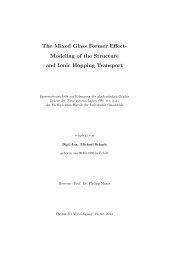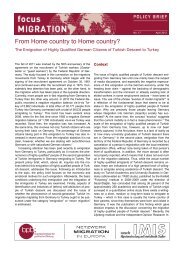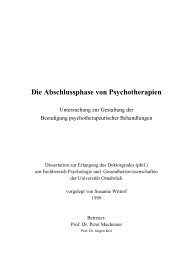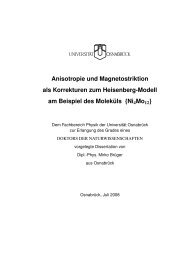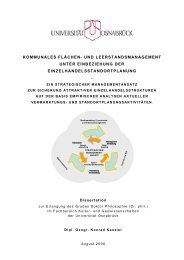358 Literatur RIJCKEN, C. A.W., MONSTER, T. B.M., BROUWERS, J. R. B. J. & DE JONG-VAN DEN BERG, L. T. W. (2003). Chlorpromazine equivalents versus defined daily doses: How to compare antipsychotic drug doses? Journal of Clinical Psychopharmacology, 23(6), 657-659. RINA, H., TERAO, T., NAKANO, H., OKAMOTO, T., IWATA, N. & NAKAMURA, J. (2004). Predicting denial function of schizophrenic patients by the picture completion subtest of WAIS-R. Progress in Neuro-Psychopharmacology & Biological Psychiatry, 28(7), 1185-1187. RITSHER, J. B., OTILINGAM, P. G. & GRAJALES, M. (2003). Internalized stigma of mental illness: psychometric properties of a new measure. Psychiatry Research, 121(1), 31-49. RITSHER, J. B. & PHELAN, J. C. (2004). Internalized stigma predicts erosion of morale among psychiatric outpatients. Psychiatry Research, 129(3), 257-265. RITSNER, M. S. & BLUMENKRANTZ, H. (2007). Predicting domain-specific insight of schizophrenia patients from symptomatology, multiple neurocognitive functions, and personality related traits. Psychiatry Research, 149(1-3), 59-69. RIVERA-MINDT, M. & SPAULDING, W. (2002). The coping strategies task: Assessment of coping in schizophrenia. Psychiatric Rehabilitation Skills, 6(3), 428-453. ROBINS, R. W. & JOHN, O. P. (1997). The quest for self-insight: Theory and research on accuracy and bias in selfperception. In R. HOGAN, J. A. JOHNSON & S. R. BRIGGS (Hrsg.), Handbook of personality psychology (S. 649-679). San Diego: Academic Press. RODER, V., BRENNER, H. D. & KIENZLE, N. (2002). Integriertes Psychologisches Therapieprogramm bei schizophren Erkrankten – IPT (5. Aufl.). Weinheim: Beltz. ROE, D. & BEN-YISHAI, A. (1999). Exploring the relationship between the person and the disorder among individuals hospitalized for psychosis. Psychiatry: Interpersonal and Biological Processes, 62(4), 370-380. ROE, D. & CHOPRA, M. (2003). Beyond coping with mental illness: Toward personal growth. American Journal of Orthopsychiatry, 73(3), 334-344. ROE, D., HASSON-OHAYON, I., KRAVETZ, S., YANOS, P. T. & LYSAKER, P. H. (2008). Call it a monster for lack of anything else: Narrative insight in psychosis. Journal of Nervous and Mental Disease, 196(12), 859-865. ROE, D. & KRAVETZ, S. (2003). Different Ways of Being Aware of a Psychiatric Disability: A Multifunctional narrative approach to insight into mental disorder. Journal of Nervous and Mental Disease, 191(7), 417-424. ROE, D., YANOS, P. T. & LYSAKER, P. H. (2006). Coping with psychosis: An integrative developmental framework. Journal of Nervous and Mental Disease, 194(12), 917-924. ROESCH, S. C. & WEINER, B. (2001). A meta-analytic review of coping with illness: Do causal attributions matter? Journal of Psychosomatic Research, 50(4), 205-219. ROGERS, R. W. (1975). A protection motivation theory of fear appeals and attitude change. Journal of Psychology: Interdisciplinary and Applied, 91(1), 93-114. ROGOSA, D. R. (1995). Myth and methods: 'Myth about longitudinal research' plus supplemental questions. In J. M. GOTTMAN (Hrsg.), The analysis of change (S. 6-66). Mahwah, NJ, USA: Lawrence Erlbaum. ROME, H. P. (1979). The classifications of schizophrenia: An historical review. Psychiatric Annals, 9(1), 12-31. ROOKE, O. & BIRCHWOOD, M. (1998). Loss, humiliation and entrapment as appraisals of schizophrenic illness: A prospective study of depressed and non-depressed patients. British Journal of Clinical Psychology, 37(3), 259-268. ROSENTHAL, R. (1991). Meta-analytic procedures for social research (rev. ed.). Thousand Oaks, CA, USA: Sage. ROSENTHAL, R. & ROSNOW, R. L. (1991). Essentials of behavioral research: Methods and data analysis (2. Aufl.). New York: McGraw Hill. ROSNOW, R. L., & ROSENTHAL, R. (1996). Computing contrasts, effect sizes, and counternulls on other people's published data: General procedures for research consumers. Pyschological Methods, 1, 331-340. ROSSELL, S. L., COAKES, J., SHAPLESKE, J., WOODRUFF, P. W. R. & DAVID, A. S. (2003). Insight: Its relationship with cognitive function, brain volume and symptoms in schizophrenia. Psychological Medicine, 33(1), 111-119. ROSSI, A., ARDUINI, L., PROSPERINI, P., KALYVOKA, A., STRATTA, P. & DANELUZZO, E. (2000). Awareness of illness and outcome in schizophrenia. European Archives of Psychiatry and Clinical Neuroscience, 250(2), 73-75. ROTTER, J. B. (1975). Some problems and misconceptions related to the construct of internal versus external control of reinforcement. Journal of Consulting and Clinical Psychology, 43(1), 56-67. RÜGER, U., BLOMERT, A. F. & FÖRSTER, W. (1990). Coping: theoretische Konzepte, Forschungsansätze, Messinstrumente zur Krankheitsbewältigung. Göttingen: Vandenhoeck & Ruprecht. RÜSCH, N. & ANGERMEYER, M. C. & CORRIGAN, P. W. (2005). Das Stigma psychischer Erkrankung: Konzepte, Formen <strong>und</strong> Folgen. Psychiatrische Praxis, 32(5), 221-232. RUSSELL, A. J., MUNRO, J., JONES, P. B., HAYWARD, P., HEMSLEY, D. R. & MURRAY, R. M. (2000). The National Adult Reading Test as a measure of premorbid IQ in schizophrenia. British Journal of Clinical Psychology, 39(3), 297- 305. SACKEIM, H. A., & GUR, R. C. (1978). Self-deception, self-confrontation, and consciousness. In G. E. Schwartz & D. Shapiro (Hrsg.), Consciousness and self-regulation: Advances in research, Vol. 2 (S. 139-197). New York: Plenum Press.
359 Literatur SACKEIM, H. A. & GUR, R. C. (1979). Self-deception, other-deception, and self-reported psychopathology. Journal of Consulting and Clinical Psychology, 47(1), 213-215. SACKEIM, H. A. & GUR, R. C. (1985). Voice recognition and the ontological status of self-deception. Journal of Personality and Social Psychology, 48(5), 1365-1368. SACKEIM, H. A. & WEGNER, A. Z. (1986). Attributional patterns in depression and euthymia. Archives of General Psychiatry, 43(6), 553-560. SAEEDI, H., ADDINGTON, J., ADDINGTON, D. (2007). The association of insight with psychotic symptoms, depression, and cognition in early psychosis: A 3-year follow-up. Schizophrenia Research, 89(1-3), 123-128. SAJATOVIC, M. & JENKINS, J. H. (2007). Is antipsychotic medication stigmatizing for people with mental illness? International Review of Psychiatry, 19(2), 107-112. SALKOVSKIS, P. M. (1991). The importance of behaviour in the maintenance of anxiety and panic: A cognitive account. Behavioural Psychotherapy, 19(1), 6-19. SALOKANGAS, R. K. R., HONKONEN, T. & STENGÅRD, E. (2007). Social role behaviour of patients with long-term schizophrenia in the community during sharp decline in number of psychiatric beds. Journal of Mental Health, 16(5), 663-678. SANZ, M., CONSTABLE, G., LOPEZ-IBOR, I., KEMP, R. & DAVID, A. S. (1998). A comparative study of insight scales and their relationship to psychopathological and clinical variables. Psychological Medicine, 28, 437-446. SAPARA, A., COOKE, M., FANNON, D., FRANCIS, A., BUCHANAN, R. W., ANILKUMAR, A. P. P., BARKATAKI, I., AASEN, I., KUIPERS, E. & KUMARI, V. (2007). Prefrontal cortex and insight in schizophrenia: A volumetric MRI study. Schizophrenia Research, 89(1-3), 22-24. SARAVANAN, B., DAVID, A. S., BHUGRA, D., PRINCE, M. & JACOB, K. S. (2005). Insight in people with psychosis: The influence of culture. International Review of Psychiatry, 17(2), 83-87. SARAVANAN, B., JACOB, K. S., JOHNSON, S., PRINCE, M., BHUGRA, D. & DAVID, A. S. (2007) Belief models in first episode schizophrenia in South India. Social Psychiatry and Psychiatric Epidemiology, 42(6), 446-451. SARAVANAN, B., JACOB, K. S., PRINCE, M., BHUGRA, D. & DAVID, A. S. (2004). Culture and insight revisited. British Journal of Psychiatry, 184(2), 107-109. SARTORIUS, N., SHAPIRO, R. & JABLENSKY, A. (1974). The international pilot study of schizophrenia. Schizophrenia Bulletin, 1(11), 21-34. SARTORY, G., THOM, A., GRIESE, J., YOUNG, D., BUTORAC, M., POKRAJA-BULIAN, A. & SENDULA, M. (2001). Lack of insight and concomitant neuropsychological deficits in schizophrenia. Zeitschrift für Neuropsychologie, 12(1), 54-60. SATZ, P. (1993). Brain reserve capacity on symptom onset after brain injury: A formulation and review of evidence for threshold theory. Neuropsychology, 7(3), 273-295. SAYRE, J. (2000). The patient's diagnosis: Explanatory models of mental illness. Qualitative Health Research, 10(1), 71- 83. SCHEFF, T. J. (1966). Being mentally ill: A sociological theory. Chicago: Aldine. SCHEIER, M. F. & CARVER, C. S. (1985). Optimism, coping, and health: Assessment and implications of generalized outcome expectancies. Health Psychology, 4(3), 219-247. SCHMELING-KLUDAS, C. (2000). Bewältigungsformen, Behandlungszufriedenheit <strong>und</strong> Adaption stationär behandelter geriatrischer Patienten. Zeitschrift für Gerontologie <strong>und</strong> Geriatrie, 33(2), 134-142. SCHMID, R., NEUNER, T., CORDING, C. & SPIEßL, H. (2006). Lebensqualität schizophren Erkrankter <strong>und</strong> ihr Zusammenhang mit Krankheitsbewältigungsstrategien <strong>und</strong> Behandlungsaspekten. Psychiatrische Praxis, 33(7), 337-343. SCHMIDT, K.-H. & METZLER, P. (1992). Wortschatztest (WST). Weinheim: Beltz. SCHÖTTKE, H. (2000). Arbeitsgedächtnis, Kontextinformation <strong>und</strong> Problemlösen mit dem Turm von Hanoi nach einer traumatischen Hirnschädigung. Zeitschrift für Differentielle <strong>und</strong> Diagnostische Psychologie, 21(4), 304-318. SCHÖTTKE, H., BARTRAM, M. & WIEDL, K. H. (1993). Psychometric implications of learning potential assessment: A typological approach. In J. H. M. HAMERS, K. SIJTSMA & A. J. J. M. RUIJSSENAARS (Hrsg.), Learning potential assessment: Theoretical, methodological and practical issues (S. 153-174). Amsterdam: Swets & Zeitlinger. SCHRETLEN, D. (1997). Brief Test of Attention. Odessa, FL, USA: Psychological Assessment Ressources. SCHULTZ, W. & DICKINSON, A. (2000). Neuronal coding of prediction errors. Annual Review of Neuroscience, 23, 473- 500. SCHUMACHER, A., KESSLER, T., RIEDEL, A. & BÜCHNER, T. (1996). Lebensqualität <strong>und</strong> Krankheitsverarbeitung bei Patienten mit akuter myeloischer Leukämie. Psychotherapie Psychosomatik Medizinische Psychologie, 46(11), 385- 390. SCHUMACHER, J. & RESCHKE, K. (1994). Theoretische Konzepte <strong>und</strong> empirische Methoden der Bewältigungsforschung. In Verband Deutscher Rentenversicherungsträger (Hrsg.), Die Norm des Ges<strong>und</strong>seins – Lebensqualität <strong>und</strong> Kranksein (Bd. 6: Klinische Psychologie in der Rehabilitationsklinik) (S. 41-73). Frankfurt a. M.: VdR. SCHWARTZ, R. C. (2000). Insight and suicidality in schizophrenia: A replication study. Journal of Nervous and Mental Disease, 188(4), 235-237. SCHWARTZ, R. C., COHEN, B. N. & GRUBAUGH, A. (1997). Does insight affect long-term inpatient treatment outcome in chronic schizophrenia? Comprehensive Psychiatry, 38(5), 283-288. SCHWARTZ, R. C. & PETERSEN, S. (1999). The relationship between insight and suicidality among patients with schizophrenia. Journal of Nervous and Mental Disease, 187(6), 376-378.
- Seite 1 und 2:
Krankheitseinsicht, dynamisch getes
- Seite 3 und 4:
Danksagung iii Einleitung Es wird Z
- Seite 5 und 6:
v Einleitung 5.2.3.5 Prozessorienti
- Seite 7 und 8:
vii Einleitung 12.1.3 Ergebnisse St
- Seite 9 und 10:
ix Einleitung Tabelle 45. Hauptkomp
- Seite 11 und 12:
Tabelle 1. Verzeichnis der wichtigs
- Seite 13 und 14:
Abstract xiii Einleitung Objective:
- Seite 15 und 16:
15 Einleitung Angesichts der Belieb
- Seite 17 und 18:
17 Einleitung Bewältigungsmodell v
- Seite 19 und 20:
19 Wisconsin Card Sorting Test 2001
- Seite 21 und 22:
21 Wisconsin Card Sorting Test Effe
- Seite 23 und 24:
23 Wisconsin Card Sorting Test Das
- Seite 25 und 26:
Tabelle 2. Exekutive und Arbeitsged
- Seite 27 und 28:
3.3 Durchführung und Kennwerte des
- Seite 29 und 30:
3.4 WCST-Defizite bei Schizophrenie
- Seite 31 und 32:
Tabelle 5. Konzeptuelles Schema zur
- Seite 33 und 34:
3.5.1 Attributidentifikation / Abst
- Seite 35 und 36:
35 Wisconsin Card Sorting Test oder
- Seite 37 und 38:
37 Wisconsin Card Sorting Test elem
- Seite 39 und 40:
39 Wisconsin Card Sorting Test ein
- Seite 41 und 42:
41 Wisconsin Card Sorting Test Fehl
- Seite 43 und 44:
43 Wisconsin Card Sorting Test zus
- Seite 45 und 46:
45 Wisconsin Card Sorting Test Lern
- Seite 47 und 48:
3.5.5 Orientierungsvariablen 47 Wis
- Seite 49 und 50:
49 Wisconsin Card Sorting Test zehn
- Seite 51 und 52:
51 Wisconsin Card Sorting Test Fehl
- Seite 53 und 54:
53 Wisconsin Card Sorting Test mit
- Seite 55 und 56:
55 Wisconsin Card Sorting Test PAOL
- Seite 57 und 58:
Tabelle 6. Übersicht über Studien
- Seite 59 und 60:
3.7.3 Faktorstruktur des WCST 59 Wi
- Seite 61 und 62:
Tabelle 7 (Fortsetzung). (o) (p) (q
- Seite 63 und 64:
3.8.2 Bildung 63 Wisconsin Card Sor
- Seite 65 und 66:
3.9 Der Dynamische WCST in der Schi
- Seite 67 und 68:
67 Wisconsin Card Sorting Test darg
- Seite 69 und 70:
69 Wisconsin Card Sorting Test WIED
- Seite 71 und 72:
71 Wisconsin Card Sorting Test Durc
- Seite 73 und 74:
73 Wisconsin Card Sorting Test 3.9.
- Seite 75 und 76:
75 Wisconsin Card Sorting Test WALL
- Seite 77 und 78:
4. Statistische Modelle der Veränd
- Seite 79 und 80:
79 Reliable Change Index mittleren
- Seite 81 und 82:
81 Reliable Change Index (b) x2 sol
- Seite 83 und 84:
83 Reliable Change Index (3.) regre
- Seite 85 und 86:
85 Reliable Change Index Bei einem
- Seite 87 und 88:
87 Reliable Change Index statistisc
- Seite 89 und 90:
89 Reliable Change Index der Differ
- Seite 91 und 92:
91 Reliable Change Index Patienten
- Seite 93 und 94:
93 Reliable Change Index Tabelle 8.
- Seite 95 und 96:
95 Reliable Change Index WIEDL, WIE
- Seite 97 und 98:
97 Coping und Abwehr (3.) die oftma
- Seite 99 und 100:
Darstellung der wichtigsten tiefenp
- Seite 101 und 102:
101 Coping und Abwehr unterschiedli
- Seite 103 und 104:
103 Coping und Abwehr von Bewältig
- Seite 105 und 106:
105 Coping und Abwehr bedrohliche K
- Seite 107 und 108:
107 Coping und Abwehr das Problem d
- Seite 109 und 110:
5.2.3.6 Antezedenzien von Bewertung
- Seite 111 und 112:
6. Krankheitseinsicht von Menschen
- Seite 113 und 114:
113 Krankheitseinsicht die Bedeutun
- Seite 115 und 116:
115 Krankheitseinsicht Kombination
- Seite 117 und 118:
117 Krankheitseinsicht negative Bew
- Seite 119 und 120:
119 Krankheitseinsicht Während die
- Seite 121 und 122:
121 Krankheitseinsicht WARNER, TAYL
- Seite 123 und 124:
123 Krankheitseinsicht Symptomatik
- Seite 125 und 126:
125 Krankheitseinsicht (z. B. aus d
- Seite 127 und 128:
127 Krankheitseinsicht Diesem Zweck
- Seite 129 und 130:
6.5.2 Krankheitseinsicht: Begriffsk
- Seite 131 und 132:
131 Krankheitseinsicht Der erste be
- Seite 133 und 134:
Tabelle 11. Konfigurationen von Ein
- Seite 135 und 136:
6.5.4.1 Einsichts-Interviews 135 Kr
- Seite 137 und 138:
137 Krankheitseinsicht having sympt
- Seite 139 und 140:
139 Krankheitseinsicht Self-Apprais
- Seite 141 und 142:
141 Krankheitseinsicht chronifizier
- Seite 143 und 144:
143 Krankheitseinsicht have a menta
- Seite 145 und 146:
145 Krankheitseinsicht veröffentli
- Seite 147 und 148:
147 Krankheitseinsicht werden als r
- Seite 149 und 150:
149 Krankheitseinsicht Wichtig wär
- Seite 151 und 152:
151 Krankheitseinsicht Die Befundla
- Seite 153 und 154:
Pfad b Interaktionale Konstruktion
- Seite 155 und 156:
155 Krankheitseinsicht Validierung
- Seite 157 und 158:
6.5.12 Die nosologische Hypothese:
- Seite 159 und 160:
159 Krankheitseinsicht Die Möglich
- Seite 161 und 162:
161 Krankheitseinsicht Exekutivfunk
- Seite 163 und 164:
163 Krankheitseinsicht (z. B. HILL,
- Seite 165 und 166:
165 Krankheitseinsicht Einige Autor
- Seite 167 und 168:
167 Krankheitseinsicht Fehlattribut
- Seite 169 und 170:
6.5.14 Motivationale Hypothesen: Ab
- Seite 171 und 172:
171 Krankheitseinsicht Das RS-Konze
- Seite 173 und 174:
173 Krankheitseinsicht problemzentr
- Seite 175 und 176:
175 Krankheitseinsicht ursprünglic
- Seite 177 und 178:
177 Krankheitseinsicht reduzierter
- Seite 179 und 180:
179 Krankheitseinsicht äußerst kn
- Seite 181 und 182:
Prämorbide Intelligenz Psychose- E
- Seite 183 und 184:
183 Krankheitseinsicht personen, al
- Seite 185 und 186:
6.5.16 Multifaktorielle Einsichts-M
- Seite 187 und 188:
187 Krankheitseinsicht Erkrankungsb
- Seite 189 und 190:
7. Fragestellungen und Hypothesen 1
- Seite 191 und 192:
Hypothese 2.4: Validierung anhand d
- Seite 193 und 194:
Hypothese 3.3: Einsicht und Exekuti
- Seite 195 und 196:
8. Methoden 8.1 Beschreibung der In
- Seite 197 und 198:
197 Methoden Select-by-marker-Analy
- Seite 199 und 200:
199 Methoden eine weitere, eher all
- Seite 201 und 202:
201 Methoden Obwohl ursprünglich l
- Seite 203 und 204:
203 Methoden Tabelle 15 stellt den
- Seite 205 und 206:
205 Ergebnisse Studie 1 Hälfte auc
- Seite 207 und 208:
207 Ergebnisse Studie 1 Tabelle 18.
- Seite 209 und 210:
9.4 Hauptkomponentenanalyse des WCS
- Seite 211 und 212:
10. Ergebnisse Studie 2: 211 Ergebn
- Seite 213 und 214:
213 Ergebnisse Studie 2 postakuten
- Seite 215 und 216:
215 Ergebnisse Studie 2 entspricht
- Seite 217 und 218:
217 Ergebnisse Studie 2 Verteilung
- Seite 219 und 220:
Tabelle 24. Übersicht über berech
- Seite 221 und 222:
Tabelle 26. Zehn WCST-Performanztyp
- Seite 223 und 224:
223 Ergebnisse Studie 2 Zusammenhan
- Seite 225 und 226:
10.6 Unterschiedstests und Konkorda
- Seite 227 und 228:
227 Ergebnisse Studie 2 nach LANDIS
- Seite 229 und 230:
229 Ergebnisse Studie 2 zur Decke,
- Seite 231 und 232:
10.8 Komposition von Metatypen 231
- Seite 233 und 234:
Tabelle 35. Cluster-Varianzen und F
- Seite 235 und 236:
10.8.2 Übereinstimmung von RCI-Typ
- Seite 237 und 238:
Tabelle 39. Kreuztabelle WCSTdyn-Cl
- Seite 239 und 240:
239 Ergebnisse Studie 2 Die dargest
- Seite 241 und 242:
Tabelle 42. Korrekte Sortierungen i
- Seite 243 und 244:
10.9 Soziodemographische und klinis
- Seite 245 und 246:
Tabelle 45. Rotierte Komponentenmat
- Seite 247 und 248:
10.10 Externe Validierung der Metat
- Seite 249 und 250:
249 Ergebnisse Studie 2 Es besteht
- Seite 251 und 252:
Tabelle 51. Lernverläufe der AVLT-
- Seite 253 und 254:
253 Ergebnisse Studie 2 10.10.3 Faz
- Seite 255 und 256:
255 Ergebnisse Studie 2 Angesichts
- Seite 257 und 258:
10.12 Analyse von WCST-Fehlerprofil
- Seite 259 und 260:
259 Ergebnisse Studie 2 ausschließ
- Seite 261 und 262:
261 Ergebnisse Studie 2 Die Fehler-
- Seite 263 und 264:
263 Ergebnisse Studie 3 den Zusamme
- Seite 265 und 266:
265 Ergebnisse Studie 3 übrigen It
- Seite 267 und 268:
267 Ergebnisse Studie 3 Partialkorr
- Seite 269 und 270:
Tabelle 66. Symptombewusstheit, Pos
- Seite 271 und 272:
271 Ergebnisse Studie 3 11.6 Konver
- Seite 273 und 274:
11.8 Aktive und passive Medikations
- Seite 275 und 276:
11.10 Einsicht, Exekutivfunktionen
- Seite 277 und 278:
277 Ergebnisse Studie 3 Offenheit k
- Seite 279 und 280:
279 Ergebnisse Studie 3 52 Patiente
- Seite 281 und 282:
281 Ergebnisse Studie 3 wies einen
- Seite 283 und 284:
283 Ergebnisse Studie 3 Insgesamt k
- Seite 285 und 286:
285 Ergebnisse Studie 3 Das gleiche
- Seite 287 und 288:
287 Ergebnisse Studie 3 G12 = 3,5 (
- Seite 289 und 290:
Tabelle 81. Kognition und Symptomat
- Seite 291 und 292:
291 Ergebnisse Studie 3 Aufgrund de
- Seite 293 und 294:
293 Ergebnisse Studie 3 Es ist auff
- Seite 295 und 296:
295 Ergebnisse Studie 3 Im nächste
- Seite 297 und 298:
297 Ergebnisse Studie 3 kognitiv le
- Seite 299 und 300:
299 Diskussion An einer nicht-psych
- Seite 301 und 302:
Hypothese Gegenstand Ergebnis 2.1 S
- Seite 303 und 304:
3.5 Kurvilinearer Zusammenhang (qua
- Seite 305 und 306:
12.2.2 Diskussion Studie 2: RCI-Ver
- Seite 307 und 308: 307 Diskussion Insbesondere scheint
- Seite 309 und 310: 309 Diskussion »Metatypen« zu kl
- Seite 311 und 312: 311 Diskussion Fehlertypen: Währen
- Seite 313 und 314: 313 Diskussion Funktionsbereiche (s
- Seite 315 und 316: 12.2.3.1 Diskussion der OSSTI 315 D
- Seite 317 und 318: 12.2.3.2 Einsicht und Depressivitä
- Seite 319 und 320: 12.2.3.3 Einsicht und Exekutivfunkt
- Seite 321 und 322: 321 Diskussion Arbeitsgedächtnis (
- Seite 323 und 324: 323 Diskussion zur hirnorganisch ve
- Seite 325 und 326: 12.2.3.5 Überprüfung des Einsicht
- Seite 327 und 328: 327 Diskussion sozialer Konsequenze
- Seite 329 und 330: 329 Diskussion Diagnose zurückwies
- Seite 331 und 332: 12.3 Schlusswort 331 Diskussion Die
- Seite 333 und 334: Literatur ACKERMANN, R. & DERUBEIS,
- Seite 335 und 336: 335 Literatur BAUMEISTER, R. F., DA
- Seite 337 und 338: 337 Literatur BURNS, J. W. (2000).
- Seite 339 und 340: 339 Literatur DABAN, C., AMADO, I.,
- Seite 341 und 342: 341 Literatur FERRERI, M., ROUILLON
- Seite 343 und 344: 343 Literatur GOLDMAN, R. S., AXELR
- Seite 345 und 346: 345 Literatur HAYGOOD, R. C. & BOUR
- Seite 347 und 348: JANZARIK, W. (2003). Der Psychose-B
- Seite 349 und 350: 349 Literatur KOLB, B. & WHISHAW, I
- Seite 351 und 352: 351 Literatur LYSAKER, P. H. & BELL
- Seite 353 und 354: 353 Literatur MCGUIGAN, F. J. (1974
- Seite 355 und 356: 355 Literatur NIEUWENSTEIN, M. R.,
- Seite 357: 357 Literatur PINI, S., CASSANO, G.
- Seite 361 und 362: 361 Literatur SMITH, T. E., HULL, J
- Seite 363 und 364: 363 Literatur TRANULIS, C., LEPAGE,
- Seite 365 und 366: 365 Literatur WEILER, M. A., FLEISH
- Seite 367 und 368: 367 Literatur YOUNG, D. A., ZAKZANI
- Seite 369 und 370: Perseverative Fehler Prätest .161
- Seite 371 und 372: C Einverständniserklärung 371 Anh
- Seite 373 und 374: E Fragebogen zur Behandlungseinsch
- Seite 375 und 376: F FKV-Instruktion »Trait« 375 Anh
- Seite 377 und 378: Coping Strategies Task (CST): Auswe
- Seite 379: 379 Anhang Erklärung über die Eig



